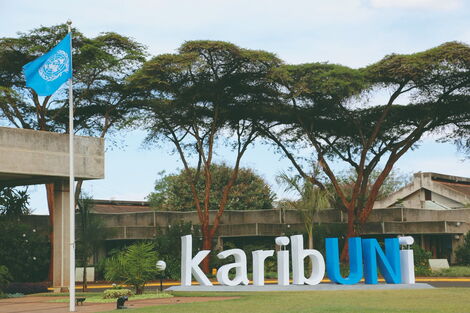-
President Uhuru Kenyatta Signing Government Documents TWITTER
-
The United Nations has stepped in to solve Kenya’s historical land injustices after the British government refused to execute this mandate.
The United Nations Human Rights Council (UNHRC) has written to President Uhuru Kenyatta, asking his administration to share crucial information on the matter.
UNHRC seeks to be informed whether the colonizer had offered any form of compensation or psychological and physical rehabilitation to the affected communities.
“Please indicate if financial support has been granted by the government of the UK, of Great Britain and Northern Ireland and/or the multinational tea companies to provide social, medical and educational services,” read a part of the letter.
 Entrance to United Nations offices in Nairobi. TWITTER
Entrance to United Nations offices in Nairobi. TWITTERThe letter also sought that the UN be informed if infrastructure and essential utilities to compensate for the victims’ suffering, as recommended by the National Land Commission (NLC) had been offered.
The development follows a petition filed by Kericho Governor Paul Chepkwony at the UN headquarters in Geneva. Chepkwony first filed the case against the British authorities in 2014 on behalf of 500,000 victims of colonial torture from the Kipsigis and Talai communities.
They were subjected to unlawful torture, inhuman and degrading treatment, arbitrary detention, arbitrary displacement and violations of rights to privacy, family life and property.
Attempts to have the British government settle these disputes were all in vain since they decided to set a timeline for filing cases on land injustices and bodily harm, rendering this specific case impossible to solve.
The United Kingdom went ahead and made it law that cases related to personal injuries have a limit of three years and land claims have a limit of 12 years.
In August, the UN rights body directed the British government to issue a public apology and compensate the 500,000 Kenyans who have lodged the case.Kenyans.co.uk




